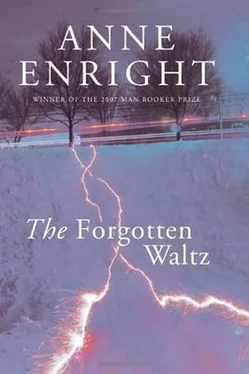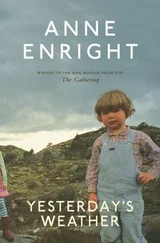They walked the hospital corridors looking for an exit, with Evie still exhausted in her father’s arms, and they felt – at least Seán felt – the heaviness and beauty of her head, as it rolled on his shoulder, the mystery of bringing her into the world, and the way she escaped the mystery by being so absolutely and pragmatically herself. They looked around them, memorising their future in this place: the signed football jerseys in their frames, the wire games on wooden tables, and yellowing murals of cartoon characters long gone out of fashion. A cleaner asked were they lost, which they were. A passing nurse said, ‘Do you know your way out?’ There were only two kinds of people in this place – people who were nice, and people who were lost. They held hands. They had never been closer; heading for the swing doors of the children’s hospital and the daylight beyond.
For the next several months they bought and wrangled their way up the waiting lists and the house was run according to Evie’s medical schedule. They rose in darkness, wrapped her in a blanket and carried her to the car. Seán drove as the dawn slipped down the hillsides, filling the bowl of Dublin Bay with a pale mist, and the sun rose out of the sea in front of them, washed and white. In the hospital, Evie was hot and damp and delicious to the touch, as they carried her down one corridor or another to the right waiting room, or the wrong one, where nice people (they were all nice, all of them) took their paperwork or redirected them, and they walked on, looking through the glass panel on each door in case they should stumble into a ward where the bald children were, or the children with scars too big for their small bodies: all the hopeful little freaks. Very quickly, they stopped seeing the children’s diseases and saw them as real children, and this frightened them too: the idea that this reversal of nature could be an ordinary thing. They did not look at their own reflections. Not ever. Each sick, or even dying, child – beautiful as a flower – seemed to be attached to some unwashed parent, who slept on the floor, and forgot to get her roots done, and looked like a refugee.
After the first few appointments, Aileen said there was no point in the pair of them spending their lives down there, she could manage on her own. Then, when the tests were clear, she threw it back at him, saying, ‘You couldn’t even come to the hospital, you weren’t even there.’
It was the relief that made her shout. The diagnosis, when it came, was very terrible, or very hopeful – it was hard to say which. Dr Prentice said that Evie would, in all probability, grow out of the seizures. She did not have a tumour, she would probably not die – unless in her sleep, suddenly, for no reason at all: unless in the bath, or under a car, or in their living room, if she had a seizure while standing beside the fire. There was nothing wrong with her, she seemed to say, except for this thing that was wrong with her. The medication was presented as a choice: seizures or no seizures, you decide.
‘Most people,’ said Dr Prentice, in her kind, crisp way, ‘opt for the latter.’
The pills made Evie confused – at least Aileen thought so. A contented, almost biddable child, she got frustrated and threw tantrums, even in the morning – when all that lovely forgetting was now turned into something more sinister. Aileen thought she might be having hallucinations.
‘You think?’ said Seán.
It was hard to tell. The child was four years old: she spent her day in a state of constant imagining. But Aileen said she stopped dead in the street, or startled at nothing. Every so often, she lifted a hand as though brushing cobwebs from in front of her eyes. She said strange things. Aileen did not know if this was some kind of shadow of the seizures that had now stopped, or a side effect of the pills she took to stop them. Seán privately thought it was a symptom of Aileen’s anxiety, but they both listened to Evie’s prattle with a more attentive ear.
After months of this fretfulness and concern, and many hundreds of hours on the internet, Aileen decided to take Evie off her medication.
‘I want my little girl back,’ she said.
Aileen’s worry had become impossible. She had worried so hard and for so long, it had transcended itself and turned into a rapture of care.
‘It’s not her anymore,’ she said. ‘It’s not Evie.’
Seán argued that the child was only four: ‘She’s changing every minute,’ he said. ‘She’s never the same.’
To which Aileen answered, ‘ How can you not know?’
So Evie was weaned off her tablets and the seizure, when it happened, was almost a relief, after so many days of waiting for it to come. Days and weeks of being present and mindful, waiting for the crackle in her brain, fearful of the shadows, as the sun was cut to flitters by the roadside trees. Do you smell something, Evie? Do you see something? What are you thinking, Evie?
It happened in the crèche where Evie now spent her days. The woman in charge didn’t seem to bat an eyelid. It was an event. She had managed it.
‘I just held her in my arms,’ she said. ‘Poor little mite.’
Not that they liked her for it.
‘What a cow,’ said Aileen, because reality had shifted for them, one more time. They were now looking at a world in which an absent, juddering child was a normal thing. Their child. Their beautiful, ever-present Evie.
There is no doubt that Aileen, who was above all things rational, was not behaving rationally when she decided to put an end to this nonsense, once and for all. She put Evie on a diet. It was a medical diet. The hospital they attended did not supervise it, but some hospitals did, she said, though it was usually for children much worse off than Evie. It was a ketogenic regime – like Atkins but weirder and stricter – it seemed to involve endless but very exact amounts of whipped cream. No carbohydrates were allowed. None whatsoever. Not an apple, not the stain of sauce on a baked bean. One crisp and the child would be foaming at the mouth and falling under the nearest bus, no question.
Seán should have argued it out, he said. Or he should have talked to her more – Aileen that is – made her feel less lonely in it. But it was all unstoppably itself, he thought. And there was nothing so terribly wrong with whipped cream. So he just let her at it.
The diet never worked. At least, Evie never stuck to it – Seán suspected, besides, that the crèche woman was feeding her Hula Hoops, out of sympathy. They started fresh every Monday, by Thursday Evie would be discovered with sugar on her breath. Aileen would go into the next room in order to compose herself, then she would come back to discuss things with Evie.
‘Remember, Mrs Mooch, how we talked about your brain?’
One evening, after finding a nest of peach stones stuffed down the back of the sofa, Aileen stood and wept. They were turning their daughter into a failure, she said; their fabulous daughter, who was now a constant disappointment to them; also, when it came to food, an accomplished thief and liar. And though Aileen saw all this happening, she did not know how to fix it, and there was nothing Seán could do except stand outside the circle and tell her that everything was going to be all right when it was not all right. It was all impossible. And it was all her fault.
It was during this phase of their lives, the ketogenic phase, that I saw Seán for the first time, standing at the bottom of my sister’s garden in Enniskerry. I do not know what he was thinking about. He might have been thinking about Evie, or about work, or about a woman at work. He might have been admiring the view, or wondering how much the houses were worth, between here and the sea. Perhaps he was pining for my sister Fiona, who is so pretty and sad. Or he might have been thinking about nothing. The way men often claim to do.
Читать дальше












